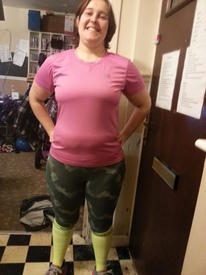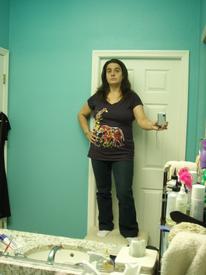"wheat belly"
Replies
-
Here's my opinion:
- If you love wheat, eat it.
- If you hate wheat, don't eat it.
- Some people can't eat it because they are intolerant.
- Some love it and might not even realize they are intolerant (yet).
I love wheat, it's tasty. Though I am suspicious of my tolerance to it so I might be going wheat free. Personally, I'm so darn sick of each month a new food gains hatred by everyone then a few months later, it's suddenly golden goodness again.0 -
I like wheat, I eat wheat, I enjoy my wheat products, they don't make me sick, and I'm loosing weight while eating them.
There ARE people that have something called Celiac disease. It makes their bodies respond very badly to gluten, which is found in wheat. There are other presentations of a wheat sensitivity.
If you like it, eat it in moderation, and aren't sensitive to it, eat it. If it makes you sick, don't eat it.
Everyone's different.
^^^
That.0 -
I got this book last month. The author makes a lot of interesting and convincing claims but researching into myself most is based on mis and anecdotal information about wheat itself. For instance when he harps on about wheats opiate-like character, the same study he mentioned actually said milk proteins produce the highest activity and its allowed on the diet.
Some things are good and pretty much common sense. I agree that we don't need to eat nearly as much wheat but then it really is the wheat-products, such as cakes etc., that are the problem with obesity. But the diet is really another low-carb diet with an agenda on wheat. Altogether its not bad and you probably won't become deficient in anything despite that you have to avoid fruit as you still can eat vegetables but in moderation there really isn't anything wrong with wheat unless you have an intolerance to it.0 -
Yeh, wheat is an excellent rich food. That's why we developed it.hi! so, people I know have recently become obsessed with the book Wheat Belly - I've never read it though.
But I thought WHOLE GRAINS were good for you? Are they not?
Canada's Food Guide recommends 6 servings a day - so I am very confused.
You could easily make the case that whole grains are no better or even worse than more refined grains, but that does not mean they are bad for you or should be avoided. Personally give me the white rice, and white flour over whole wheat versions anyday
The only advantage to whole wheat is the fibre. It's all good.
"Gluten free" is a marketing ploy based upon a fad. Very few people, probably 1 in a 1000 are are actually genetically predisposed to a gluten intolerance.
You would actually be surprised as to how many people have intolerances, just because they are not diagnosed, or do not have Celiac's doesn't mean they don't get sick eating it.
I have candida, i cannot have wheat products, I am gluten free, however i do have quinoa, basmati or brown rice. If I happen to have anything with wheat in it, my stomach bloats severely and I do feel ill if the quantities consumed are too large.
Our society eats way too many carbs in general, our plates should be filled with protein and vegetables, not a plate of pasta. Quinoa and rice are not man-made products, whereas pasta & breads are processed!! think about it.0 -
personally, I don't eat it because I feel so much better without it, don't need it ...why eat it if it makes me feel like crap
 0
0 -
One food for thought- I'm a coeliac and therefore no wheat ever!!! However over the last 10 years I've managed to get 100lbs overweight.
Wheat/gluten does cause lots of problems for people - many coeliacs are undiagnosed ( there has even been a parliamentary debate on trying to increase awareness of the disease) and if you have the symptoms its worth getting it checked out BEFORE going gluten free as biopsies/blood tests will come back negative unless gluten is in the diet. Many others have problems with wheat although they do not have coeliacs - it is worth going wheat free if you have ibs to see if it makes a difference.
However for the healthy individual I would carry on eating wheat.0 -
[/quote]
Yeh, wheat is an excellent rich food. That's why we developed it.
The only advantage to whole wheat is the fibre. It's all good.
"Gluten free" is a marketing ploy based upon a fad. Very few people, probably 1 in a 1000 are are actually genetically predisposed to a gluten intolerance.
[/quote]
This is taken from coeliac uk website:
Research shows that coeliac disease affects 1 in 100 people in the UK, making it much more common than previously thought. Under-diagnosis is a big problem. Research suggests around 500,000 people have not yet been diagnosed .
Coeliac disease is much more common then people think - then you also have people who have wheat/gluten intolerances and recently they are doing research into non-coeliac coeliac disease which presents the same as coeliacs tests negatively.
For more information and to stop the myths have a look at http://www.coeliac.org.uk/coeliac-disease/myths-about-coeliac-disease.0 -
If you are that worried about it, get an official diagnosis. Dont self medicate based on a sensaltionalized book.0
-
I would see a nutritionist if you are truly concerned over whether it is needed. Every body is different, so it is possible that some need it while others do not.0
-
Ok, so wheat is an excellent food for 99% of people. Peanuts are fine too for most but deadly for some.
This is taken from coeliac uk website:
Research shows that coeliac disease affects 1 in 100 people in the UK, making it much more common than previously thought. Under-diagnosis is a big problem. Research suggests around 500,000 people have not yet been diagnosed .
Coeliac disease is much more common then people think - then you also have people who have wheat/gluten intolerances and recently they are doing research into non-coeliac coeliac disease which presents the same as coeliacs tests negatively.
For more information and to stop the myths have a look at http://www.coeliac.org.uk/coeliac-disease/myths-about-coeliac-disease.0 -
I am reading the book and have been trying to be "less gluten" the last several weeks after doing about 2 weeks of completely "free." I started my experiment because of the recommendation of a couple of folks (whom I respect and trust) who tried it and had some good results. And by good results, I don't mean weight loss. I mean decreased joint pain and less digestive issues. Which is exactly what happened with me. Some knee and shoulder pain I've been battling with for a while is gone (I do a lot of high impact and strength exercise). As are frequent stomach cramps and all those fun issues. (Except twice - once after a slice of pizza, once after some toast.) So, it works for me. But I believe the same thing for eating and exercise - you gotta do what works for YOU, not me!!0
-
From the above link to the UK coeliac site:Coeliac disease is not a food allergy or an intolerance, it is an autoimmune disease. In coeliac disease, eating gluten causes the lining of the small intestine to become damaged. Other parts of the body may be affected.
This is a testable hypothesis and the results should be interesting.0 -
Nah, not all grains are the same, and I find that wheat, even organic, makes me gain literally two inches on my waist within a day, and then if I skip that and eat nice organic quinoa, organic flax seeds, nongluten oats, it shrinks down, but it takes a little longer for that to happen, a few days. It took me a really long time to figure out that I was sensitive, since I've been vegetarian for decades and used to just sort of live on mac and cheese and pasta, and it kept me bloated and depressed and all. Since I figured it out and am getting good protein like quinoa and quorn roasts and beans and nuts, healthy fats like organic olive oil, and drinking tons of water, I feel and look much better. I do notice that other stuff like too much dairy and sugar and even things made of rice, which is usually said to not have gluten, will do that to me too, so it is worth noting that wheat is not necessarily the only thing that can irritate digestion--candida can come from other imbalances too--and also I swear the genetically-modified crap has made me feel it muchmuch worse than way back when. I'm old enough to feel and see the difference in a lot of things, and I genuinely feel genetically-modified crap is harming people. Just my view--0
-
[/quote]
"Gluten free" is a marketing ploy based upon a fad. Very few people, probably 1 in a 1000 are are actually genetically predisposed to a gluten intolerance.
[/quote]
^^^This. I work in a medical laboratory, and testing for Celiac Disease is extremely costly (Prometheus is what it's called) and nearly every single one comes back negative. People aren't as intolerant as they think. I even had dear friend this week tell me that her Chiro told her she's intolerant.... where's the science in that??? Now she's eating GF and to me- for absolutely no good reason whatsoever. Hogwash.
That being said- I do eat a lot of "low carb" products, sometimes GF at that- but that's because they bulk up these things with the fiber and protein that I want- and are usually lower in calories. La Tortilla Factory low carb tortilla is one product that I love. 50 calories and lots of fiber.0 -
From the above link to the UK coeliac site:Coeliac disease is not a food allergy or an intolerance, it is an autoimmune disease. In coeliac disease, eating gluten causes the lining of the small intestine to become damaged. Other parts of the body may be affected.
This is a testable hypothesis and the results should be interesting.
Yes, you are correct. In addition, this is considered the "gold standard" in diagnosing celiac. It is done through endoscopy into the small intestines to look for (via biopsy) damage consistent with the disease. I am suspicious of any celiac diagnosis made without this test.
http://digestive.niddk.nih.gov/ddiseases/pubs/celiactesting/Celiac_Testing_CDAC_PP.pdf0 -
I am doing a low-carb keto diet and eat no grains whatsoever (along with eliminating all sugars)... i''ve lost 30lbs as of today and i feel SO much better. When i stopped eating breads, pastas, potatoes, rice etc. i no longer get heartburn, i have TONS of energy, and i don't feel like i need a nap after every meal...
There is a lot of research suggesting that we are not suited to digesting wheat's, grains, and most other agricultural product since our caveman ancestors didn't farm: they hunted and gathered. The people doing the Paleo diet will also tell you about this, they go the extra step and eliminate cheeses as well (i could never betray cheese like that... i love it too much...)0 -
since our caveman ancestors didn't farm: they hunted and gathered. The people doing the Paleo diet will also tell you about this, they go the extra step and eliminate cheeses as well (i could never betray cheese like that... i love it too much...)
UH OH
this thread may have just gotten derailed0 -
Also, i should add the food guide pyramid needs to be flipped upside down, tons of proteins and animal fats, major restrictions on grains and sugars0
-
Personally give me the white rice, and white flour over whole wheat versions anyday
because of the taste?
Yup, the nutritional differences are not as great as you are lead to believe, so go for whatever you prefer the taste of. Same goes for sweet vs white potatoes
I agree the differences are marginal. I just think if you're trying to lose weight or cut belly fat or whatever it IS a good idea to cut back on breads/grains as well as refined sugars - but not because they're evil - mostly because they're just sort of empty calories. You could be eating other things that still supply your body with carbs/sugars necessary for fuel but are higher in other nutritional values.0 -
By the way I still eat grains and sugary things on a regular basis, but nowhere near what I used to while I was GAINING all this weight
 0
0 -
And even then i still think we place to much emphasis on fibre.
HAHAHAHAA that's a joke right? Most people don't get enough fiber... and the RDI is pretty pitiful. Aside from the obvious digestive benefits, did you know fiber helps pull cholesterol out of your blood? Most people get well below the RDI, which is already considerably low.0 -
What is most interesting I have found personally and from a few others I know, is a lot of us are sensitive to gluten and processed flours (basically all flours/grains that aren't natural and/or organic) and we don't know it because we can explain away alot of our symptoms. But once you cut it out, suddenly you're not as bloated, have less headaches, more energy and their has been a drop in weight. Then you reintroduce it, and here comes some of the problems again. Makes a difference mentally also for some.0
-
What is most interesting I have found personally and from a few others I know, is a lot of us are sensitive to gluten and processed flours (basically all flours/grains that aren't natural and/or organic) and we don't know it because we can explain away alot of our symptoms. But once you cut it out, suddenly you're not as bloated, have less headaches, more energy and their has been a drop in weight. Then you reintroduce it, and here comes some of the problems again. Makes a difference mentally also for some.
This has been my experience, and I don't need a costly test to prove it... I'm LIVING it! Wheat is inflammatory and so cutting it out of my diet has completely changed how I feel: no more IBS symptoms, joint pain, headaches, ear infections (the inflammatory properties cause excessive mucus production), heart burn — so many things I was dealing with on a daily basis.
Also I agree with iksworbez, I can't give up the cheese and the food pyramid should for sure be flipped!0 -
it's junk science. some M.D. trying to make a quick buck with a book.
here's a gluten-free advocate who researched the source material and has nothing good to say about the book:
http://noglutennoproblem.blogspot.com/2012/03/wheat-belly-busted.html
^^ This. The guy isn't making enough money as a doctor, so he wrote a sensational book with NO scientific research, just his own "patient's" *ahem* results and experiences.0 -
Nah, not all grains are the same, and I find that wheat, even organic, makes me gain literally two inches on my waist within a day, and then if I skip that and eat nice organic quinoa, organic flax seeds, nongluten oats, it shrinks down, but it takes a little longer for that to happen, a few days. It took me a really long time to figure out that I was sensitive, since I've been vegetarian for decades and used to just sort of live on mac and cheese and pasta, and it kept me bloated and depressed and all. Since I figured it out and am getting good protein like quinoa and quorn roasts and beans and nuts, healthy fats like organic olive oil, and drinking tons of water, I feel and look much better. I do notice that other stuff like too much dairy and sugar and even things made of rice, which is usually said to not have gluten, will do that to me too, so it is worth noting that wheat is not necessarily the only thing that can irritate digestion--candida can come from other imbalances too--and also I swear the genetically-modified crap has made me feel it muchmuch worse than way back when. I'm old enough to feel and see the difference in a lot of things, and I genuinely feel genetically-modified crap is harming people. Just my view--
I only mentionned gluten pertaining to candida as the thread is about this. Having candida has restricted me to a dairy-free, gluten-free and sugar-free lifestyle. None of those products can be ingested until intestinal flora is back to normal. it is not a lifelong lifestyle, however i do find that my quality of life has increased since I stopped consuming those above-mentionned products.0 -
The problem with this is all those symptoms are things that wax and wane. It's how homeopaths make money from selling magic water. You have no way of knowing what changes caused what since you have no control group with which to compare it.What is most interesting I have found personally and from a few others I know, is a lot of us are sensitive to gluten and processed flours (basically all flours/grains that aren't natural and/or organic) and we don't know it because we can explain away alot of our symptoms. But once you cut it out, suddenly you're not as bloated, have less headaches, more energy and their has been a drop in weight. Then you reintroduce it, and here comes some of the problems again. Makes a difference mentally also for some.
This has been my experience, and I don't need a costly test to prove it... I'm LIVING it! Wheat is inflammatory and so cutting it out of my diet has completely changed how I feel: no more IBS symptoms, joint pain, headaches, ear infections (the inflammatory properties cause excessive mucus production), heart burn — so many things I was dealing with on a daily basis.
Also I agree with iksworbez, I can't give up the cheese and the food pyramid should for sure be flipped!0 -
This has been my experience, and I don't need a costly test to prove it... I'm LIVING it! Wheat is inflammatory and so cutting it out of my diet has completely changed how I feel: no more IBS symptoms, joint pain, headaches, ear infections (the inflammatory properties cause excessive mucus production), heart burn — so many things I was dealing with on a daily basis.The problem with this is all those symptoms are things that wax and wane. It's how homeopaths make money from selling magic water. You have no way of knowing what changes caused what since you have no control group with which to compare it.
I wish. Unfortunately, my symptoms do not wax and wane - they are pretty darn concrete. I wish that homeopathic medications would fix this but the only thing that works for my wheat allergies usually involves real medication (Benadryl, Atarax, Zyrtec, and more) and not ingesting any of it at all. I avoid being near lawns when people mow them and religiously am careful about getting into contact with plants as some affect me fast. You don't need a control group if you take the wheat and immediately get hives - usually the headaches start appearing within a few days of ingesting the wheat. I know a friend who has it and within an hour she's in the bathroom for HOURS after ingesting it with horrifying symptoms. Control group? Heck, you don't need a control group for symptoms...some symptoms are pretty darn easy to identify.0 -
There is a difference between a wheat allergy and being celiac and having a gluten sensitivity.
My husband is allergic to wheat. Can't eat it or touch it. Just having it on his skin causes blisters. He can eat things with gluten with no issues. It's easier for him to just be gluten free but since he's discovered what the issue is he's gained about 50 lbs so the theory of weight loss goes out the window there.
My granddaughter is celiac. She has to eat gluten free or she has severe intestinal issues, so bad that as a baby we had to make sure she was changed within seconds of a bowel movement or her little bum would be raw. Imagine what that was doing on the inside? Since getting a diagnosis for her at about 2 she's finally started to grow and catch up with other kids. Again not a weight loss issue with going gluten free.
Being gluten sensitive will cause some minor digestive upset but doesn't harm the villae the way celiac disease does.0 -
I don't have any problem with wheat products, but gave them up a few months ago at the encouragement of a health psychologist friend. Haven't noticed a difference with the exception that more of my calories come from protein, which works for my goals, so I'm good with that. Don't particularly miss it anymore.0
-
The way I approach new ideas is to have an open mind and know that my body is different from everyone elses and I tweak and modify things to fit me. I did quit eating grains and sugar and get the bulk of my carbs from fruit and vegtables, started excercising more cardio and weight lifting and found that my menopausal poofy belly started to become less poofy. I am not hardcore with following no wheat but do find that when I do eat it my belly bloats and is quite uncomfortable and my joints ache more.
Now people that is just me!
As with anything you really need to do what fits for your body and everyone is different and there is NO ONE PLAN FITS ALL so as consumers it is our job to research, test, trail and error till we find what works. Reading new ideas and expanding your knowledge is always good....but always remember.....If it sounds too good to be true then it probably is!
My post menopausal belly is poofy no more since I quit eating bread, rice, pasta and potatoes... and sugar. BUT as the quoted poster says --- "That is just ME"... I don't eat corn any more either... but I do enjoy almonds, walnuts, and avocados! I do most days enjoy one square of 72% cocoa dark chocolate. I discovered I don't do well on one of my favorite foods - cheese. But greek yogurt is ok.. Go figure. Literally.. we all have to figure out what is best for our own bodies so be open to try new things.0
This discussion has been closed.
Categories
- All Categories
- 1.4M Health, Wellness and Goals
- 398.2K Introduce Yourself
- 44.7K Getting Started
- 261K Health and Weight Loss
- 176.4K Food and Nutrition
- 47.7K Recipes
- 233K Fitness and Exercise
- 462 Sleep, Mindfulness and Overall Wellness
- 6.5K Goal: Maintaining Weight
- 8.7K Goal: Gaining Weight and Body Building
- 153.5K Motivation and Support
- 8.4K Challenges
- 1.4K Debate Club
- 96.5K Chit-Chat
- 2.6K Fun and Games
- 4.7K MyFitnessPal Information
- 17 News and Announcements
- 21 MyFitnessPal Academy
- 1.5K Feature Suggestions and Ideas
- 3.2K MyFitnessPal Tech Support Questions



















